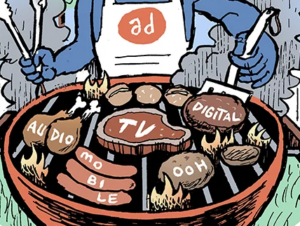Here’s today’s AdExchanger.com news round-up… Want it by email? Sign up here.
Place Your Bots
“Good boy, Rufus. You fetched a deal!”
That’s one way to greet Amazon’s new built-in AI chatbot, Rufus, available for US customers in Amazon-owned apps, Bloomberg reports.
Amazon’s Rufus is yet another example of Big Tech incorporating AI chatbots directly into its consumer-facing platforms.
But Rufus also shows how much these omniscient generative AI services are actually limited to the platform itself.
For instance, Meta AI is good at planning meetups and scanning and setting up messages. What it knows is based on people’s networks of connections and behavior on Facebook, Instagram and WhatsApp. Rufus is a shopping assistant. When Google Bard is fooled, it is often waylaid because of the search engine crawler – like when the Google AI suggested people put glue in pizza dough, it came from Google’s crawler spotting a Reddit comment.
Grok, Twitter’s version of an AI bot, is the one that returns a clearly gendered tone; it’s a young, very online male of a type that esteems Elon Musk.
In other words, these things are what they eat.
Never-Ending Search
Antitrust matters aside, Google is dealing with serious pushback on its search engine monetization. The degradation of Google Search is a society-wide anecdotal event.
The new CEO of Snowflake explicitly founded his former startup, Neeva, on the notion that Google has lost its way due to paid media usurping organic results.
But the train never stops.
The latest trick up Google’s sleeve is to place search ads directly below featured snippets. The snippets are organic. They’re the Wikipedia-type text and bullet points atop some search results or sometimes pulled from a press release or reputable site with an authoritative response to the query.
The ad can be for a standard text-based sponsored link or a shopping carousel of sponsored product links.
The ads are labeled but mixed between sets of organic content.
Google Ads liaison Ginny Marvin confirmed in a tweet that the units are “part of an ongoing evolution of dynamic ad placement on search, and something we’ll continue to experiment with,” Search Engine Roundtable reports.
These ads complicate the sell for Google’s “top ads.” Nowadays, self-described top ads might fall below an organic featured snippet, sponsored unit and organic results.
But those clicks are worth it.
Political Proselytizing
Last month’s presidential debate did more than ignite bipartisan calls for President Biden to drop out of the election. It also potentially changed the trajectory of political advertising between now and November, Ad Age reports. Democrats have committed $300 million in ad spend for 2024 races, half of which will take place after Labor Day.
For one thing, both candidates are facing scandals with very different effects on potential advertising. Donald Trump was convicted of falsifying business records in 2016 to cover up payments to an adult film star. But the Trump campaign enjoyed a wave of fundraising following the verdict. Since President Biden’s debate, donations to his campaign have reportedly run thin. The Biden campaign also announced an additional $50 million for ad buys in swing states to “reset” in the wake of the damage control and calls to drop out of the race.
Presidential campaigns direct a ton of ad budgets and can also boost state-level campaigns in swing states, because more ad budget means more attention to other Democratic candidates. But the president’s race comes first. It makes a big difference if the Biden camp, for instance, focuses heavily on what’s called the Blue Wall: Pennsylvania, Wisconsin and Michigan are the three most up for grabs. But Nevada and Arizona are highly competitive states and have Senate races more likely to flip from Democrat to Republican this year.
But Wait, There’s More!
Companies seem determined to make everything a retail media network. How did we get here? [Digiday]
The man behind the AI gaffes at Sports Illustrated and USA Today has a yearslong history of filling the internet with garbage. [The Verge]
Elon Musk’s X hit by EU over breach of digital content law. [WSJ]
Why women are disappearing from tech. [The Information]
You’re Hired!
Olaplex names Katie Gohman, formerly chief marketer of Marc Jacobs, as its own CMO. [WSJ]















